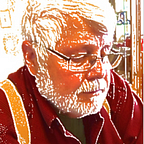Simple Grace
Our front windows face the east in the valley where we live, and mountains climb to more than 3,000 feet. The days begin and end in the east and south sun, and the clouds and rain and snow let me follow the day as a valley member. This morning was chilly, and the birdbaths had a slight sliver of ice. Later in the morning, bees began to feed in the birdbaths, and we placed rocks in the baths to lessen the risk of drowning. I pulled three bees out of the water and put them on a warm bench, where two of the three bees revived and flew away. The third be, most likely some gentle and timid lady worker, was too small to survive the dunking.
We feed the pine siskins, blackbirds, starlings, and flickers before our breakfast of hashbrowns and a mocha coffee. An hour later, the bees from their two hives flew in and out and returned with pollen on their legs and back. The bees are gentle creatures, and I can walk among them and watch and listen to them in complete peace. Their concerns centre on the building of comb and the sealing of cells where larva will soon appear as lady bees to take their turn in supporting the hives.
O. J. Wilson said that of all the species on the planet, only about 20 work collectively to feed, protect, and maintain their home. Most of the 20 species are invertebrates, and one species is human. This cooperation, love, care, and anger in defence, given the home base, is staggering. No one individual is more important than another, not even a queen bee or the most talented warrior of the humans. We work out our ethics within this web and conform to a moral code of necessity, love, and defence.
This evening Diane is at a meeting where she has been asked to become a board member. It’s a large group called the Paradise Center in Paradise, Montana, just 7 miles down the highway. The Paradise Center took over the responsibility for a three-story schoolhouse with a history of about 100 years. The schoolhouse has been extensively remodelled and hosts the arts, a museum, and a place for community members to meet.
Paradise was a railroad town with a longhouse for train repairs and a railroad tie factory fifty years ago. There were hotels and restaurants in the converted stagecoach house, water tanks, and multiple parallel railroad lines where the trains would park and reassemble and leave again. Paradise has lost its population except for a few hundred people, primarily seniors. Paradise vibrates with memories of another active lifestyle. It’s a town that’s still unincorporated, fighting for its tradition of family and near-constant homecoming.
